托福TPO1-34阅读词汇题完整汇总(电子版)
- 格式:docx
- 大小:2.76 MB
- 文档页数:4
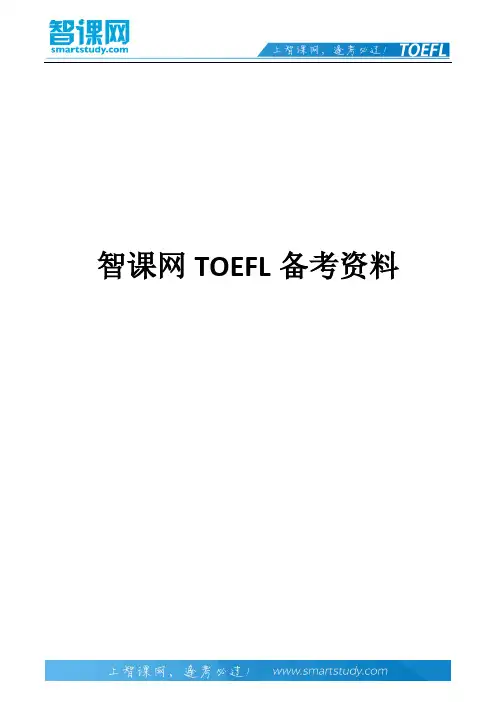
智课网TOEFL备考资料托福TPO1-34重点词汇大全(听说读写)分享到:摘要:托福TPO1-34重点词汇大全(听说读写)!学好托福词汇是做好TPO词汇题的关键,所以大家在备考中一定要多积累,多准备。
托福TPO重点词汇大全中整理了TPO中各单项的重点词汇,希望能够帮助大家备考。
托福 TPO1-34重点词汇大全(听说读写)!学好托福词汇是做好TPO词汇题的关键,所以大家在备考中一定要多积累,多准备。
托福TPO重点词汇大全中整理了TPO中各单项的重点词汇,希望能够帮助大家备考。
TPO 1中的重点词汇vital生死攸关的essential必要的usual通常的context环境;上下文;来龙去脉environment环境connection连接influence影响,势力,感化requirement要求,必需品core核心center中心material物质的;重要的;肉体的; 材料layer层,阶层;地层frame框架depict描画;描述portray描绘;扮演imagine想象classifies分类elevate提升perplexed困惑的puzzled困惑的;茫然的defeated击败的occupied使用中的preposterous可笑的unbelievable不可信的inadequate不充分的limited有限的creative创造性的accumulating积累increasing增加convincing令人信服的; 有说服力的extensive广泛的impose on强加place on 加强于artificial人造的not real不真实的attractive吸引人的; 有魅力的;引人注目的 short-term短期的prediction预言expectation 期待surprise惊奇explanation说明;解释discovery发现pinpoint精确描述locate exactly精确定位observe 观察; 注意到recognize承认;认出,识别derive源于;得自gain增加require要求;需要use 使用produce生产;引起;创作相关推荐:托福听力TPO词汇论文对话场景整理托福词汇中介词用法大全托福短语关于in case的用法解读相关字搜索:托福TPO1-34重点词汇大全。

托福考试 复习托福阅读TPO1(试题+答案+译文)第3篇:Timberline Vegetation on Mountains托福阅读原文The transition from forest to treeless tundraon a mountain slope is often a dramatic one. Within a vertical distance of just a few tens of meters, trees disappear as a life-form and are replaced by low shrubs, herbs, and grasses. This rapid zone of transition is called the upper timberline or tree line. In many semiarid areas there is also a lower timberline where the forest passes into steppe or desert at its lower edge, usually because of a lack of moisture.The upper timberline, like the snow line, is highest in the tropics and lowest in the Polar Regions. It ranges from sea level in the Polar Regions to 4,500 meters in the dry subtropics and 3,500-4,500 meters in the moist tropics. Timberline trees are normally evergreens, suggesting that these have some advantage over deciduous trees (those that lose their leaves) in the extreme environments of the upper timberline. There are some areas, however, where broadleaf deciduous trees form the timberline. Species of birch, for example, may occur at the timberline in parts of the Himalayas.At the upper timberline the trees begin to become twisted and deformed. This is particularly true for trees in the middle and upper latitudes, which tend to attain greater heights on ridges, whereas in the tropics the trees reach their greater heights in the valleys. This is because middle- and upper- latitude timberlines are strongly influenced by the duration and depth of the snow cover. As the snow is deeper and lasts longer in the valleys, trees tend to attain greater heights on the ridges, even though they are more exposed to high-velocity winds and poor, thin soils there. In the tropics, the valleys appear to be more favorable because they are less prone to dry out, they have less frost, and they have deeper soils. There is still no universally agreed-on explanation for why there should be such a dramatic cessation of tree growth at the upper timberline. Various environmental factors may play a role. Too much snow, for example, can smother trees, and avalanches and snow creep can damage or destroy them. Late-lying snow reduces the effective growing season to the point where seedlings cannot establish themselves. Wind velocity also increases with altitude and may cause serious stress for trees, as is made evident by the deformed shapes at high altitudes. Some scientists have proposed that the presence of increasing levels of ultraviolet light with elevation may play a role, while browsing and grazing animals like the ibex may be another contributing factor. Probably the most importantenvironmental factor is temperature, for if the growing season is too short and temperatures are too low, tree shoots and buds cannot mature sufficiently to survive the winter months.Above the tree line there is a zone that is generally called alpine tundra. Immediately adjacent to the timberline, the tundra consists of a fairly complete cover of low-lying shrubs, herbs, and grasses, while higher up the number and diversity of species decrease until there is much bare ground with occasional mosses and lichens and some prostrate cushion plants. Some plants can even survive in favorable microhabitats above the snow line. The highest plants in the world occur at around 6,100 meters on Makalu in the Himalayas. At this great height, rocks, warmed by the sun, melt small snowdrifts.The most striking characteristic of the plants of the alpine zone is their low growth form. This enables them to avoid the worst rigors of high winds and permits them to make use of the higher temperatures immediately adjacent to the ground surface. In an area where low temperatures are limiting to life, the importance of the additional heat near the surface is crucial. The low growth form can also permit the plants to take advantage of the insulation provided by a winter snow cover. In the equatorial mountains the low growth form is less prevalent.托福阅读试题1.The word “dramatic” in the passage(paragraph 1) is closest in meaning toA.gradualplexC.visibleD.striking2.Where is the lower timberline mentionedin paragraph 1 likely to be found?A.In an area that has little waterB.In an area that has little sunlightC.Above a transition areaD.On a mountain that has on uppertimberline.3.Which of the following can be inferredfrom paragraph 1 about both the upper and lower timberlines?A.Both are treeless zones.B.Both mark forest boundaries.C.Both are surrounded by desert areas.D.Both suffer from a lack of moisture.4.Paragraph 2 supports which of thefollowing statements about deciduous trees?A.They cannot grow in cold climates.B.They cannot grow in cold climates.C.They are less likely than evergreens tosurvive at the upper timberline.D.They do not require as much moisture asevergreens do.5.The word “attain” in the passage(paragraph 3) is closest in meaning toA. requireB.resistC.achieveD.endure6.The word “they” in the passage (paragraph3) refers toA.valleysB.treesC.heightsD.ridges7.The word “prone” in the passage (paragraph3) is closest in meaning toA.adaptedB.likelyC.difficultD.resistant8.According to paragraph 3, which of thefollowing is true of trees in the middle and upper latitudes?A.Tree growth is negatively affected by thesnow cover in valleysB.Tree growth is greater in valleys than onridges.C.Tree growth on ridges is not affected byhigh-velocity winds.D.Tree growth lasts longer in thoselatitudes than it does in the tropics.9.Which of the sentences below best expressthe essential information in the highlighted sentence in the passage (paragraph4) ? In correct choices change the meaning in important ways or leave outessential information.A.Because of their deformed shapes at highaltitudes, trees are not likely to be seriously harmedby the strong winds typical of thosealtitudes.B.As altitude increases, the velocity ofwinds increase, leading to a serious decrease in the number of trees found athigh altitudes.C.The deformed shapes of trees at highaltitudes show that wind velocity, which increase with altitude, can causeserious hardship for trees.D.Increased wind velocity at high altitudesdeforms the shapes of trees, and this may cause serious stress for trees.10.In para graph 4, what is the author’smain purpose in the discussion of the dramatic cessation of tree growth at theupper timberline?A.To argue that none of several environmentfactors that are believed to contribute to that phenomenon do in fact play arole in causing itB.To argue in support of one particularexplanation of that phenomenon against several competing explanationsC.To explain why the primary environmentalfactor responsible for that phenomenon has not yet been identifiedD.To present several environmental factorsthat may contribute to a satisfactory explanation of that phenomenon11.The word “prevalent” in the passage(paragraph 6) is closest in meaning toA.predictableB.widespreadC.successfulD.developed12.According to paragraph 6, all of thefollowing statements are true of plants in the alpine zone EXCEPT:A.Because they are low, they are lessexposed to strong winds.B.Because they are low, the winter snowcover gives them more protection from the extreme cold.C.In the equatorial mountains, they tend tobe lower than in mountains elsewhere.D.Their low growth form keeps them closerto the ground, where there is more heat than further up.13.Look at the four squares [█] thatindicate where the following sentence could be added to the passage.This explains how, for example, alpine cushionplants have been found growing at an altitude of 6,180 meters.Above the tree line there is a zone that isgenerally called alpine tundra.█【A】Immediately adjacent to the timberline, the tundra consists ofa fairly complete cover of low-lying shrubs, herbs, and grasses, while higherup the number and diversity of species decrease until there is much bare groundwith occasional mosses and lichens and some prostrate cushion plants. █【B】Some plantscan even survive in favorable microhabitats above the snow line. The highestplants in the world occur at around 6,100meters on Makalu in the Himalayas. █【C】At thisgreat height, rocks, warmed by the sun, melt small snowdrifts.█【D】Where would the sentence best fit?14. Directions: An introductory sentencefor a brief summary of the passage is provided below. Complete the summary byselecting the THREE answer choices that express the most important ideas in thepassage. Some sentences do not belong in the summary because they express ideasthat are not presented in the passage or are minor ideas in the passage. Thisquestion is worth 2 points.At the timberline, whether upper or lower,there is a profound change in the growth of trees and other plants.A.Birch is one of the few species of treethat can survive in the extremeenvironments of the upper timberline.B.There is no agreement among scientists asto exactly why plant growth is sharply different above and below the uppertimberline.C.The temperature at the upper timberlineis probably more important in preventing tree growth than factors such as theamount of snowfall or the force of winds.D.The geographical location of an uppertimberline has an impact on both the types of trees found there and theirphysical characteristics.E.High levels of ultraviolet light mostlikely play a greater role in determining tree growth at the upper timberlinethan do grazing animals such as the ibex.F.Despite being adjacent to the timberline,the alpine tundra is an area where certain kinds of low trees can endure highwinds and very low temperatures.托福阅读答案1.dramatic剧烈的,戏剧化的,就单词本身能够想到drama戏剧,所以这个应该是戏剧的形容词,原文后句说在几十米的垂直距离内,树木完全被低矮的灌木和草取代了,所以变化非常剧烈,A渐渐B复杂C可见的都不靠谱2.以lower timberline做关键词定位至本段最后一句,说有lower timberline 是因为a lack of moisture,缺乏湿度,等于A选项中的没有水3.分别以upper timberline和lower timberline为关键词定位至本段倒数两句,不管是upper timberline还是lower timberline都是快速的过渡带,树还是有的,只是在向草原等等过渡,所以A错,既然是过渡,也就是边界了,B对,C没说,只有lower timberline缺水,所以D说both错4.以deciduous trees做关键词定位至原文的第三句和第四句,根据第四句说有的地方的timberline是由落叶树构成的,所以timberline上还是有落叶树的,所以选项A和B说反,D项moisture原文没说,第三句说timberline通常是常绿树构成的,第四句说有的时候也出现落叶树,所以常绿树比落叶树出现的概率大,所以C正确5.attain获得,想到相似的obtain和retain,原文说中高纬度的树木会变形,在山脊处怎么样更高,后半句的whereas所在句与之并列,其中reach greater heights应该和考的那部分是并列的,所以attain也是reach之意,答案是achieve,A要求B反对抵抗D忍耐都不对6.并列句,往前找,找主语,trees是正确答案,此外,被暴露在大风之下的应该是树,山谷山脊和高度都不靠谱7.prone可能,倾向于。
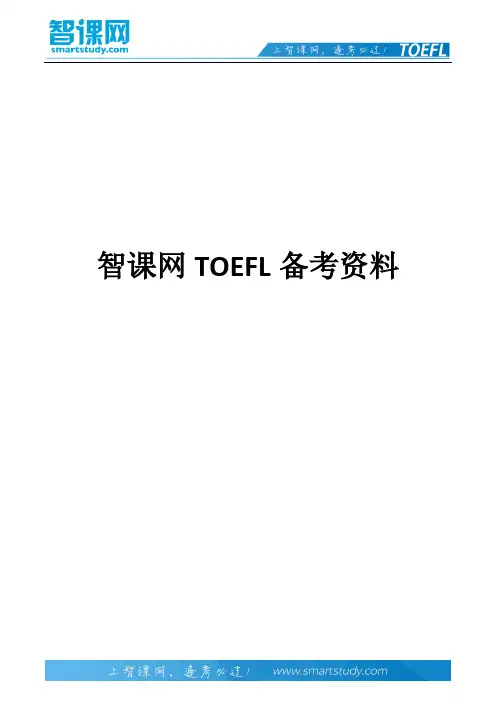
智课网TOEFL备考资料托福阅读TPO1-34题型分类汇总【PDF】摘要:托福阅读全套共有34套,每一套都是托福考试的曾经的真题,是我们冲刺托福高分必不可少的精华内容,下面我们就来详细介绍一下,希望对你的托福考试会有一定的帮助。
托福阅读考试由三篇文章构成,每篇文章大约700字左右,各有12-14道题目,考试时间为60分钟。
托福阅读文章的题材呈现不断多样化的趋势,许多同学认为由于缺乏相关学科背景会影响做题正确率,但其实左右答案所需信息都已在文章中出现,无需额外的背景知识。
现就托福阅读题型进行总结。
托福阅读的题型大体分为三类:阅读找寻信息题(Reading to Find Information)、基础理解题(BasicComprehension Question)以及篇章应用题(Reading to LearnQuestion)。
阅读找寻信息题(Reading to Find Information)考察学生能否快速高效浏览文章,找到关键信息;基础理解题(Basic Comprehension Question)考察学生对主要信息、重要事实及细节、词汇、句法及语义内容的理解的能力;篇章应用题(Reading to Learn Question)考察学生是否能准确文章目的、段落之间的关系,能否将关键信息及重要细节总结概括的能力。
如果更加细致的划分可以将所有题型分为十类:词汇题(Vocabulary questions)(3-6个每篇)、指代题(Reference questions)(0-2个每篇)、句子简化题(Sentence Simplification questions)(0-1个每篇)、细节/事实信息题(FactualInformation questions) (3-6个每篇)、否定事实信息题(Negative Factual Information questions)(0-2个每篇)、修辞目的题(Rhetorical Purpose questions)(1-3个每篇)、句子插入题(Insert Text questions)(0-1个每篇)、推断题(Inference questions)(0-2个每篇)、文章小结题(Prose Summary)(0-1个每篇,6选3)、填表题(Fill in a Table)(0-1个每篇,7选5)。
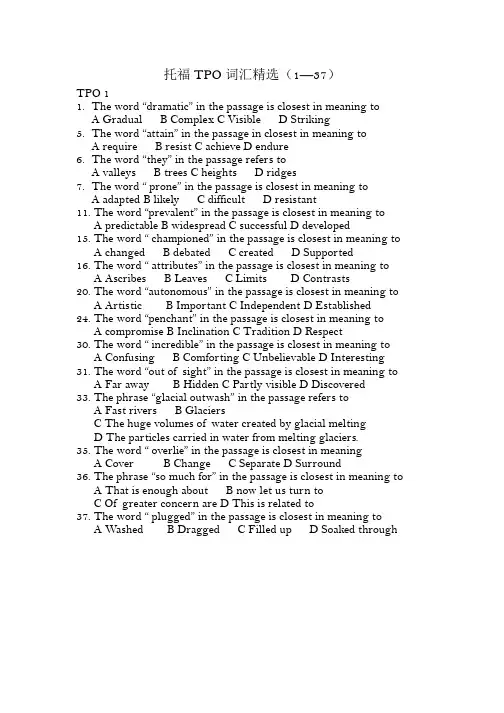
托福TPO词汇精选(1—37)TPO 11.The word “dramatic” in the passage is closest in meaning toA GradualB ComplexC VisibleD Striking5.The word “attain” in the passage in closest in meaning toA requireB resist Cachieve D endure6.The word “they” in the passage refers toA valleysB treesC heightsD ridges7.The word “ prone” in the passage is closest in meaning toA adaptedB likelyC difficultD resistant11. The word “prevalent” in the passage is closest in meaning toA predictableB widespreadC successfulD developed15. The word “ championed” in the passage is closest in meaning toA changedB debatedC createdD Supported16. The word “ attributes” in the passage is closest in meaning toA AscribesB LeavesC LimitsD Contrasts20. The word “autonomous” in the passage is closest in meaning toA ArtisticB ImportantC IndependentD Established24. The word “penchant” in the passage is closest in meaning toA compromise BInclination CTradition D Respect30. The word “ incredible” in the passage is closest in meaning toA ConfusingB ComfortingC UnbelievableD Interesting31. The word “out of sight” in the passage is closest in meaning toA Far awayB HiddenC Partly visibleD Discovered33. The phrase “glacial outwash” in the passage refers toA Fast riversB GlaciersC The huge volumes of water created by glacial meltingD The particles carried in water from melting glaciers.35. The word “ overlie” in the passag e is closest in meaningA CoverB ChangeC SeparateD Surround36. The phrase “so much for” in the passage is closest in meaning toA That is enough aboutB now let us turn toC Of greater concern areD This is related to37. The word “ plugged” in the passage is closest in meaning toA WashedB DraggedC Filled upD Soaked throughTPO 21.The word “threatened” in the passage is closest in meaningA RestrictedB EndangeredC PreventedD Rejected3.The word “delicate” in the passage is closest in meaning toA FragileB PredictableC ComplexD Valuable5. The word “progressively” in the passage is closest in meaning toA OpenlyB ImpressivelyC ObjectivelyD Increasingly7.The ph rase “devoid of” in the passage is closest in meaning to(A) Consisting of (B) Hidden by (C) Except for (D) Lacking in16. The word “precious” in the passage is closest in meaning to(A)Exact (B) Scarce (C) Valuable (D) Initial19. The word “exposed” in the passage is closest in meaning toA) Explained B) Visible C) Identified D) Located24. The word “propulsion” in the passage is closest in meaning toA) Staying afloat B) Changing directionC) Decreasing weight D) Moving forward30. The word “reading” in the passage is closest in meaning toA) FrequentlyB) Easily C) Intelligently D) Obviously31. The word “assistance” in the passage is closest in meaning toA) Criticism B) Leadership C) Help D) Approval37. The word “expanded” in the passage is closest in meaning toA) Was enlarged B) Was improved C) Was varied D) Was rejected TPO 32.The word “feasible” in the passage is closest in meaning toA) In existence B) Without questionC) Achievable D) Most likely3. The word “enhance” in the passage is closest in meaning toA) Project B) improve C) organize D) match5. The word “devised” in the passage is closest in meaning toA) Combined B) Created C) Introduced D) Suggested6. The word “ integral” is closest in meaning toA) Essential B) Variable C) Practical D) Independent10. The word “arduous” in the passage is closest in meaning toA) Difficult B) Necessary C) Skilled D) Shared18. The word “ ensuing” in the passage is closest in meaning toA) Continuing B) Surprising C) Initial D) Subsequent20. The word “ unprecedented” in the passage is closest in meaning toA) Difficult to control B) Without any restrictionC) Unlike anything in the past D) Rapidly expanding21. The word “virtually” in the passage is closest in meaning toA) Clearly B) Perhaps C) Frequently D) Almost24. The word “inevitable” in the passage is closest in meaning toA) Unfortunate B) Predictable C) Unavoidable D) Final29. The word “particular” in the passage is closest in meaning toA) Natural B) Final C) Specific D) Complex36. The word “guarantee” in the passage is closest in meaning toA) Increase B) Ensure C) Favor D) Complicate38. The word “pales” in the passage is closest in meaning toA) Increases proportionally B) DiffersC) Loses significance D) Is common40. The word “adjacent” in the passage is closest in meaning toA) Foreign B) Stable C) Fluid D) NeighboringTPO 43.The word “inhibits” in the passage is closest in meaning toA)Consists of B) Combines C) Restricts D) Establishes4.The phrase “in the same breath” in the passage is closest in meaningtoA)Impatiently B) Humorously C) Continuously D) Immediately8.The phrase “ indefinite period” in the passage is closest in meaning toperiodA)Whose end has not been determinedB)That does not begin when expectedC)That lasts only brieflyD)Whose importance remains unknown10.T he word “rebound” in the passage is closest in meaning toA) Decline B) Recovery C) Exchange D) Movement15. The word “ marked” in the passage is closest in meaning toA) Considerable B) Surprising C) Limited D) Adequate17. The word “principal” in the passage is closest in meaning toA) Major B) Likely C) Well protected D) Distinct19. The word “trappings” in the passage is closest in meaning toA) Conditions B) Problems C) Influences D) Decorations20. The word “accumulate” in the passage is close st in meaning toA) Grow up B) Build up C) Spread out D) Break apart33. The word “adjacent” in the passage is closest in meaning toA) Nearby B) Existing C) Special D) Deep37. The word “ sloping” in the passage is closest in meaning toA) Shifting B) Inclining C) Forming D) Rolling39. The word “foul” in the passage is closest in meaning toA) Reach B) Flood C) Pollute D) AlterTPO 52.The word “exhibit” in the passage is closest in meaning toA)Fight off B) show C) cause D) spread5.The word “facilitates” in the passage is closest in meaning toA)Slows down B) affects C) makes easier D) focuses on7The word “suspended” in the passage is closest in meaning toA) Grown B) protected C) spread out D) hug9. The word “afford” in the passage is closest in meaning toA) Offer B) prevent C) increase D) remove17. The word “overwhelming” in the passage is closest in meaning toA) Powerful B) favorable C) current D) reasonable20. The word “implements” in the passage is closest in meaning toA) Skills B) tools C) opportunities D) practices24. The word “ undisputed” in the passage is closest in meaning toA) Mysterious B) unexpected C) acknowledged D) significant29. The word “significant” in the passage is closest in meaning toA) Numerous B) important C) unexplained D) sudden30. The word “relatively” in the passage is closest in meaning toA) Surprisingly B) collectively C) comparatively D) characteristically31. The word “ diversification” in the passage is closest in meaning toA) Emergence of many varietiesB) Steady declined in numberC) Gradual increase in body sizeD) Sudden disappearance35. The word “promote” in the passage is closest in meaning toA) Complicate B) prevent C) encourage D) affectTPO 63. The word “exploited” in the passage is closest in meaning toA) Utilized B) recognized C) examined D) full understood4. The word “vastly” in the passage is closest in meaning toA) Quickly B) ultimately C) greatly D) initially8. The phrase “grew accustomed to” in the passage is closest in meaning toA) Began to prefer B) wanted to have C) became used to D) insisted on9. The word “retained” in the passage is closest in meaning toA) gained B) established C) profited from D) maintained14. The word “rudimentary” in the passage is closest in meaning toA) Thorough B) strict C) basic D) occasional18. The word “meticulously” in the passage is closest in meaning toA) carefully B) quickly C) frequently D)obviously22. The word “endured” in the passag e is closest in meaning toA) Vanished B) developed C) varied D) survived23. The word” virtually” in the passage is closest in meaning toA) Possibly B) absolutely C) surprisingly D) nearly29. The word “plausible” in the passage is closest in meani ng toA) Flexible B) believable C) debatable D) predictable30. The word “phenomenon” in the passage is closest in meaning toA) Exception B) repetition C) occurrence D) idea34. The word “critically” in the passage is closest in meaning toA) Fundamentally B) partially C) consistently D) subsequently35. The word “perspective” in the passage is closest in meaning toA) System B) theory C) source D) viewpointTPO 71.The word “objective” in the passage is closest in meaning toA)achievement B) requirement C) purpose D) feature9.The word “scores” in the passage is closest in meaning toA)Members B) large numbers C) populations D) different types11.T he word “ Turbulent” in the passage is closest in meaning toA)Fresh B) deep C) violent D) temperate16. T he phrase “obsession” with in the passage is closest in meaning toA) Thinking about B) fixation on C) interest in D) attitude toward19. The word “fostered” in the passage is closest in meaning toA) Accepted B) combined C) introduced D) encouraged24. The word “spheres” in the passage is closest in meaning toA) Abilities B) areas C) combinations D) models28. The word “diffused” in the passage is closest in meaning toA) Emerged B) was understood C) spread D) developed34. The word “ profound” in the passage is closest in meaning toA) Fascinating B) far-reaching C) necessary D) temporary35. The word” ritual” in the passage is closest in meaning toA) Military B) physical C) ceremonial D) permanent38. The word “ fleeing” in the passage is closest in meaning toA) Afraid of B) displaced by C) running away from D) responding toTPO 81.The word “ massive” in the passage is closest in meaning toA)Ancient B) carefully C) very large D) carefully protected3. The word “pinpoint” in the passage is closest in meaning toA) Identify precisely B) make an argument forC) Describe D) understand4. The word “ingenuity” in the passage is closest in meaning toA) Ambition B) sincerity C) faith D) cleverness8. The word “predominant” in the passage is closest in meaning toA) Most aggressive B) most productive C) principal D) earliest18. The word “cope” in the passage is closest in meaning toA) Adept B) move C) continue D) compete20. The word “fluctuation” in the passage is closest in meaning toA) Extremes B) retreats C) periods D) variations23. The word “bombard” in the passage is closest in meaning toA) Approach B) strike C) pass D) circle25. The word “disruption” in the passage is closest in meaning toA) Exhaustion B) disturbance C) modifications D) disappearance29. The word “ merge” in the passage is closest in meaning toA) Expand B) separate C) straighten out D) combine31. The word “relics” in the passa ge is closest in meaning toA) Remains B) sites C) requirements D) sources33. The word “ miniature” in the passage is closest in meaning toA) Temporary B) small C) multiple D) familiar39. The word “hints” in the passage is closest in meaning toA) clues B) features C) arguments D)effectsTPO 92.The word “persuasively” in the passage is closest in meaning toA)Aggressively B) inflexibly C) convincingly D) carefully3.The phrase “prior” to is closest in meaning toA)Before B) immediately after C) during D) in spite of8.The word “Vast” in the passage is closest in meaning toA)Frozen B)Various C) Isolated D)Huge10.T he word “inhospitable” in the passage is closest in meaning toA)not familiar B)not suitable C)not dangerous D)not reachable12.T he word “impetus” in the passage is closest in meaning toA)chance B)protection C) possibility D) incentive15. The word “justified” in the passage is closest in meaning toA) supported B) shaped C)stimulated D)suggested17. The word “flourish” in the passage is cl osest in meaning toA) Continue B) occur C) succeed D) apply20. The word “objective” in the passage is closest in meaning toA) Unbiased B) positive C) systematic D)thorough23. The word “compelling” in the passage is closest in meaning toA) Commonly held B) persuasive C) original D) practical28. The phrase “at random” in the passage is closest in meaning toA) Finally B) over a long period of timeC) Successfully D) without a definite pattern31. The word “abundantly” in the passage is closest in meaning toA) occasionally B)plentifully C)usefully D)fortunately32. The word “propagate” in the passage is closest in meaning toA) multiply B)emerge C) live D) evolve37. The word “dormant” in the passage is closest in meaning toA) hidden B) inactive C)underground D)preservedTPO 101.The word “status” in the passage is closest in meaning toA)origin B)importance C)quality D)design3. The word “evolved” in the passage is clos est in meaning toA) divided B)extended C)developed D) vanished6. The word “instigated” in the passage is closest in meaning toA)improved B)investigated C) narrowed D)caused8. The word “whereas” in the passage is closest in meaning toA)while B)previously C)surprisingly D)because19. The word “striking” in the passage is closest in meaning toA)noticeable B)confusing C) true D)unlikely21. The word “erratic” in the passage is closest in meaning toA)dramatic B)important C)unpredictable D) common24. The word “del iberations” in the passage is closest in meaning toA)records B)discussions C)results D)variations25. The word “invoked” in the passage is closest in meaning toA)demonstrated B)called upon C)supported D)expected30. The word “key” in the passage is closest in meaning toA)historical B)many C) important D)hidden34. The word “meager” in the passage is closest in meaning toA)very necessary B)very low C) traditional D)primary39. The phrase “an English innovation” in the passage is closest in meaning toA) a new development introduced by the EnglishB) an arrangement found only in England.C) a type of agreement negotiated in EnglishD)a type of partnership based on English law.TPO 111.The word “vital” in the passage is closest inA)attractive B)essential C)usual D) practical5. The word “context” in the passage is closest in meaning toA)connection B)influence C)environment D)requirement9. The word “core” in the passage is closest in meaning toA)material B)layer C)center D)frame11. The word “depicts” in the passage is closest in meaning toA)imagined B)classifies C) elevates D)portrays16. The word “perplexed” in the passage is closest in meaning toA)defeated B)interested C)puzzled D)occupied18. The word “preposterous” in the passage is closest in meaning toA)unbelievable B)inadequate C)limited D)creative26. The word “accumulating” in the passage is closest in meaning toA)new B) increasing C)convincing D)extensive29. The phrase “impose on” in the passage is closest in meaning toA)increase for B)remove from C) place on D)distribute to31. The word “artificial” in the passage is closest in meaning toA)attractive B)not real C)short-term D)well-designed34. The word “predication” in the passage is closest in meaning toA)surprise B) discovery C)explanation D)expectation35. The word “pinpoint” in the passage is closest in meaning toA)observe B)locate exactly C)copy accurately D)recognize36. The word “derive” in the passage is closest in meaning toA)require B)gain C)use D)produceTPO 121.The phrase “assisted in” in the passage is closest in meaning toA) Initiated B)dominated C)helped with D)set up3. The phrase “depicted” in the passage is closest in meaning toA) identified B)revealed C)pictured D)imagined10. The word “criteria” in the pass age is closest in meaning toA)standards B) findings C)ideas D) techniques15. The word “regarded” in the passage is closest in meaning toA)analyzed B)considered C)altered D)criticized17. The word “paradoxes” in the passage is cl osest in meaning toA)difficulties B)accomplishments C)parallels D)contradictions20. The word “overshadowed” in the passage is closest in meaning toA)distracted from B)explained C)conducted D)coordinated with23. The word “neglected” in the p assage is closest in meaning toA)failed B)needed C)started D)expected30. The word “drastically” in the passage is closest in meaning toA)obviously B)unfortunately C)rapidly D)severely33. The word “dwellers” in the passage is closest in meaning toA)settlements B)farmers C)tribes D)inhabitants35. The word “fractures” in the passage is closest in meaning toA)streams B)cracks C)storms D)earthquakes38. The word “immobile” in the passage is closest in meaning toA)enclosed B)permanent C)motionless D)intactTPO 13Q1. The word “complex” in the passage is closest in meaning toA) delicate B) elaborate C) private D)commonQ3. The word “endowing” in the passage is closest in meaning toA) leaving B) exposing C) providing D)understandingQ7. The word “size up” in the passage is closest in meaning toA) enlarge B)evaluate C) impress D) acceptQ10. The word “deviate” in the passage is closest in meaning toA) detract B) advance C) select D) departQ14. The word “Consequently” in the passage is closest in meaning toA)Therefore B)Additionally C) Nevertheless D) MoreoverQ17. The word “persistent” in the passage is closest in meaning toA) adjusted B) strong C) enduring D) predictedQ22. The word “duration” in the passage is closest in meaning toA) length B)feature C) process D) repetitionQQ25. The word “sustained” in the passage is closest in meaning toA) intense B)uninterrupted C) natural D)periodicQQ28. The word “uniformly” in the passage is closest in meaning toA) clearly B) quickly C)consistently D)occasionallyQQ32. The word “potent” in the passage is closest in meaning toA) artificial B) powerful C)common D)similarQQ35. The word “quantifiable” in the passage is closest in meaning toA) visual B) permanent C)meaningful D)measurable TPO 14QQ2. The word “verify” in the passage is closest in meaning toA) establish the truth of B) approve ofC) understand D) criticizeQQ6. The word “ adept” in the passage is closest in meaning toA) responsible B) skillful C) patient D) curiousQQ9. The word “attributes” in the passage is closest in meaning toA)Evaluations B) Attitudes C)Actions D)Characteristics QQ11. The word “credible” in the passage is closest in meaning toA)helpful B)believable C)valuable D)familiarQQ18. The word “paradoxically” in the passage is closest in meaning toA) usually B)surprisingly C)understandably D)predictably QQ24. The word “prolonged” in the passage is closest in meaning toA)unusual B)unexpected C) extended D) disastrousQQ25. The word “ exhausted” in the passage is closest in meaning toA) used up B) reduced C) wasted D) relied uponQQ28. The word “prestige” in the passage is closest in meaning toA) interest B)status C) demand D) profitQQ30. The word “profound” in the passage is closest in meaning toA) strange B) positive C) direct D) far-reachingQQ34. The word “striking” in the passage is closest in meaning toA) reliable B) noticeable C) convincing D) violentQQ35. The word “exploit” in the passage is closest in meaning toA)use to advantage B) depart from C) pay attention to D) travel across TPO 15Q1. The word “interlocked” in the passage is closest in meaning toA)intermediate B) linked C) frozen D) fully developedQ3. The word “ match” in the passage is closest in meaning toA) measure B) enlarge C) approximate D) equalQ4. The word “transform” in the passage is closest in meaning toA)break B)push C)change D) extendQ7. The word “deceiving” in the passage is closest in meaning toA) approximate B) exaggerated C) unusual D) misleadingQ10. The word “static” in the passage is closest in meaning toA) unchanging B) usable C) thick D) harmlessQ15. The phrase “unique among” in the passage is closest in meaning toA) natural to B) different from all otherC) quite common among D) familiar toQ17. The word “feat” in the passage is closest in meaning toA) remarkable achievement B) common transformationC)daily activity D) complex solutionQ19. The word “bulk” in the passage is closest in meaning toA)strength B) effort C) activity D) massQ24. The phrase “course through” in the passage is closest in meaning toA) rises through B) heats up in C) runs through D) collects in Q30. The word “extended” in the passage is closest in meaning toA) specific B) unlimited C) reasonable D)longQ35. The phrase “account for” in the passage is closest in meaning to A) describe B) challenge C) explain D) testQ38. The word “intense” in the passage is closest in meaning toA) sudden B) unusual C) immediate D) extremeTPO 16Q2. The word “repudiate” in the passage is closest in meaning toA) respect B) reject C) review D) reviseQ6. The word “consensus” in the passage is closest in meaning toA)Authority B) Responsibility C) Custom D) AgreementQ9. The word “ ethic” in the passage is closest in meaning toA) set of moral principles B) division of laborsC) economic system D) test of characterQ11. The word “intrinsically” in the passage is closest in meaning toA)fundamentally B) Surprisingly C) Consequently D) Particularly Q12. The phrase “interplay” in the passage is closest in meaning toA) Sequence B) Interpretation C) requirement D) interactionQ21. The phrase “abundance” in the passage is closest in meaning toA) weight B) requirement C) plenty D) sequenceQ22. The phrase “analogous to “ in the passage is closest in meaning toA)predicated by B) expected of C) similar to D) superior toQ26. The word “ postulated” in the passage is closest in meaning toA)hypothesized B) discovered C) reported D) generatedQ30. The word “markedly” in the passage is closest in meaning toA) essentially B)typically C) consistently D) noticeablyQ33. The word “meager” in the passage is closest in meaning toA) rich B) thin C) unique D) complexQ38. The word “eventually” in the passage is closest in meaning toA) over time B) long ago C) simply D) certainlyTPO 17Q1. The word “impetus” in the passage is closest in meaning toA) return B) opportunity C) stimulus D) obstacleQ5. The word “ dramatically” in the passage is closest in meaning toA) artificially B) greatly C) immediately D) regularlyQ10. The word “ refined” in the passage is closest in meaning toA) completed B) improved C) drawn D) checkedQ 11. The word “norms” in the passage is closest in meaning toA) purposes B) skills C) activities D) rulesQ15. Th e phrase “conspicuous” in the passage is closest in meaning toA)common B) noticeable C) different D) colorfulQ17. The word “ signal” in the passage is closest in meaning toA) change B) imitate C) communicate D) hideQ 22. The word “ inflating” in the passage is closest in meaning toA) coloring B) enlarging C) loosening D) heatingQ25. The word “ impediment” in the passage is closest in meaning toA)obstruction B) effort C) delay D) resistanceQ 26. The word “exploits” in the passage is closest in meaning toA) repeats B) makes use of C) increases the intensity ofD) recognizesQ30. The word “ derives” in the passage is closest in meaning toA) digests B) obtains C) controls D) discoversQ32 The word “ devastated” in the passage is closest in meaning toA)influenced B) infected C) strengthened D) destroyedQ 35. The word “ inadvertently” in the passage is closest in meaning toA) indefensibly B) substantially C) unintentionally D) partially Q39. The word “highlights” in the passage is closest in meaning toA) defines B) emphasizes C) reflects D) suggestsTPO 18Q5. The word “ exceptional” in the passage is closest in meaning toA)extraordinary B) surprising C) immediate D) predictable Q6. The word “ abolished” in the passage is the closest in meaning toA) ended B) raised C) returned D) loweredQ8 The word “progressive” in the passage is closest in meaning toA)rapid B) partial C) increasing D) individualQ17. The word “flaw” in the passage is closest in meaning toA) fault B) aspect C) confusion D) mysteryQ19. The word “ triggered” in the passage is closest in meaning toA)removed B) followed C) increased D) causedQ20. The word “periodically” in the passage is closest in meaning toA)continuously B) quickly C) regularly D) carefullyQ24. The word “empirical” in the passage is closest in meaning toA) reliable B) based on common senseC) relevant D) based on observationQ30. The word “ tremendous” in the passage is closest in meaning toA)distinct B) growing C) huge D) immediateQ32. The word “ acquire” in the passage is closest in meaning toA) reject B)obtain C) need D) produceQ36. The word “illuminates” in the passage is clos est in meaning toA) opens B) completes C) lights D) electrifiesQ40. The word “ initiated” is closest in meaning toA) started B) intensified C) finished D) expectedTPO 19Q4. The word “ suppress” in the passage is closest in meaning toA)respond to B) warn against C) avoid the impact of D) stop byforceQ5. The word “friction” in the passage is closest in meaning toA) rebellion B) conflict C) neglect D) crimeQ7. The phrase “entitled to” in the passage is closest in meaning to A)given the right to B) able to afford to C)encouraged to D)requiredtoQ12. The word “circumstances” in the passage is closest in meaning to A)experiences B) communities C) conditions D) lawsQ16. The word “substantiated” in the passage is closest in mean ing to A) confirmed B) noticed C)defined D) publicizedQ17. The word “trend” in the passage is closest in meaning toA) Probability B)picture C)law-like regularity D)tendencyQ18. The word “likewise” in the passage is closest in meaning toA) sometime B)similarly C) apparently D) consequentlyQ19. The word “legitimately” in the passage is closest in meaning to A) commonly B) broadly C) properly D) officiallyQ23. The word “ initiated” in the passage is closest in meaning toA) Approved B)identified C) started D) foreseenQ29. The word “accumulations” in the passage is closest in meaning toA) Signs B) Pieces C) Types D) DepositsQ30. The word “ heterogeneous” in the passage is closest in meaning toA) Remaining B) Varied C) Familiar D) LayeredQ32. The word “enjoy” in the passage is closest in meaning toA) experience B) resemble C) expect D) dominateQ36. The word “ reveal” in th e passage is closest in meaning toA) result from B) vary with C) show D) preserveTPO 20Q3. The word “fringes” in the passage is closest in meaning toA) Borders B) Groups C) Types D) DirectionsQ7. The word “proliferation” in the passage is closest in meaning toA)Growth B) Cooperation C) Importance D) SuccessQ9 The word “superseded” in the passage is closest in meaning toA) Replaced B) Reformed C) Equaled D) IncreasedQ10. The word “diverted” in the passage is closest in meaning toA) Collected B) Shifted C) Transported D) SoldQ15. The word “momentous” in the passage is closest in meaning toA)Numerous B) Regular C) Very important D0 Very positive Q17. The ph rase “this remarkable change” in the passage refers toA)warming at the end of the Ice AgeB)shifts in mountain snow linesC)the movement of people from farms to villagesD) a dramatic increase in the populationQ18. The word “exploited” in the passage is clos est in meaning toA)explored B) utilized C) inhabited D) improvedQ20. The word “ cramped” in the passage is closest in meaning toA)primitive B) secure C) extended D) confinedQ 22. The word “ shifts” in the passage is closest in meaning toA) Effects B) Similarities C) Changes D) ExceptionsQ 25. The word “abruptly” in the passage is closest in meaning toA) Informally B) Briefly C) Suddenly D) SurprisinglyQ29. The word “agencies” in the passage is closest in meaning toA)Combinations B) Problems C) Forces D) Changes。
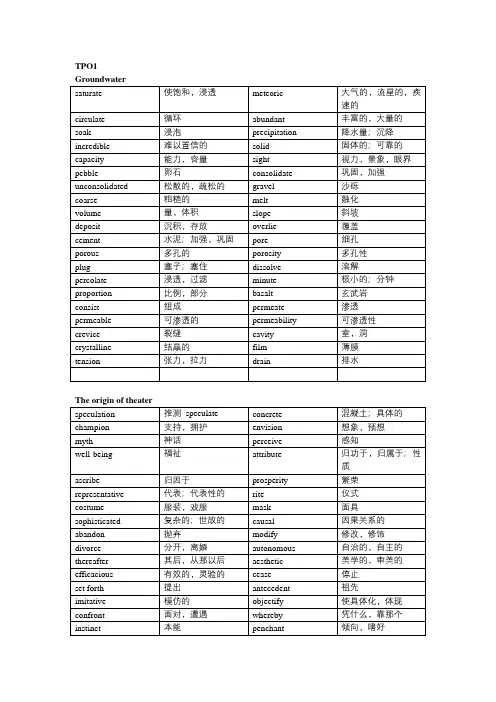
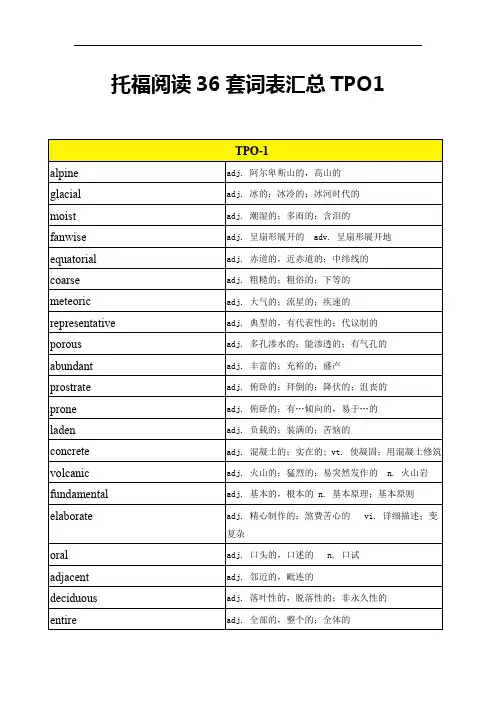
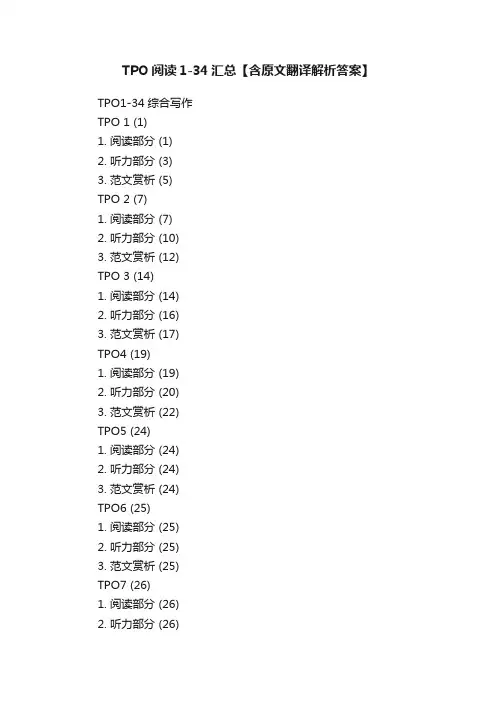
TPO阅读1-34汇总【含原文翻译解析答案】TPO1-34综合写作TPO 1 (1)1. 阅读部分 (1)2. 听力部分 (3)3. 范文赏析 (5)TPO 2 (7)1. 阅读部分 (7)2. 听力部分 (10)3. 范文赏析 (12)TPO 3 (14)1. 阅读部分 (14)2. 听力部分 (16)3. 范文赏析 (17)TPO4 (19)1. 阅读部分 (19)2. 听力部分 (20)3. 范文赏析 (22)TPO5 (24)1. 阅读部分 (24)2. 听力部分 (24)3. 范文赏析 (24)TPO6 (25)1. 阅读部分 (25)2. 听力部分 (25)3. 范文赏析 (25)TPO7 (26)1. 阅读部分 (26)2. 听力部分 (26)3. 范文赏析 (26) TPO8 (27)1. 阅读部分 (27)2. 听力部分 (27)3. 范文赏析 (27) TPO9 (28)1. 阅读部分 (28)2. 听力部分 (28)3. 范文赏析 (28) TPO10 (29)1. 阅读部分 (29)2. 听力部分 (29)3. 范文赏析 (29) TPO11 (30) 1. 阅读部分 (30) 3. 范文赏析 (30) TPO12 (31)1. 阅读部分 (31)2. 听力部分 (32)3. 范文赏析 (34) TPO13 (35)1. 阅读部分 (35)2. 听力部分 (36)3. 范文赏析 (38) TPO14 (39)1. 阅读部分 (39)2. 听力部分 (40)3. 范文赏析 (41) TPO15 (43) 1. 阅读部分 (43)3. 范文赏析 (45) TPO16 (47)1. 阅读部分 (47)2. 听力部分 (48)3. 范文赏析 (49) TPO17 (51)1. 阅读部分 (51)2. 听力部分 (52)3. 范文赏析 (54) TPO18 (55)1. 阅读部分 (55)2. 听力部分 (55)3. 范文赏析 (55) TPO19 (56)1. 阅读部分 (56)2. 听力部分 (56)3. 范文赏析 (56) TPO20 (57)1. 阅读部分 (57)2. 听力部分 (57)3. 范文赏析 (57) TPO21 (58)1. 阅读部分 (58)2. 听力部分 (58)3. 范文赏析 (58) TPO22 (59) 1. 阅读部分 (59) 3. 范文赏析 (59) TPO23 (60)2. 听力部分 (60)3. 范文赏析 (60) TPO24 (61)1. 阅读部分 (61)2. 听力部分 (61)3. 范文赏析 (61) TPO25 (62)1. 阅读部分 (62)2. 听力部分 (62)3. 范文赏析 (62) TPO26 (63)1. 阅读部分 (63)2. 听力部分 (63)3. 范文赏析 (63) TPO27 (64)1. 阅读部分 (64)2. 听力部分 (64)3. 范文赏析 (64) TPO28 (65)1. 阅读部分 (65)2. 听力部分 (65)3. 范文赏析 (65) TPO29 (66)1. 阅读部分 (66)2. 听力部分 (66)3. 范文赏析 (66) TPO30 (67)1. 阅读部分 (67)2. 听力部分 (67)3. 范文赏析 (67)TPO31 (68)1. 阅读部分 (68)2. 听力部分 (68)3. 范文赏析 (68)TPO32 (69)1. 阅读部分 (69)2. 听力部分 (70)3. 范文赏析 (70)TPO33 (71)1. 阅读部分 (71)3. 范文赏析 (71)TPO34 (72)1. 阅读部分 (72)2. 听力部分 (73)3. 范文赏析 (74)TPO 11. 阅读部分In the United States, employees typically work five days a week for eight hours each day. However, many employees want to work a four-day week and are willing to accept less pay in order to do so. A mandatory policy requiring companies to offer their employees the option of working a four-day workweek for four-fifths (80 percent) of their normal pay would benefit the economy as a whole as well as the individual companies and the employees who decided to take the option.在美国,职员一般执行的一周五天,每天八小时工作制。

Unit001Basic building materials include: timber, mud, stone, marble, brick, tile, steel, and cement concrete.基本建筑材料包括:木材、泥浆、石材、大理石、砖、瓦、钢铁和水泥混凝土。
Masonry walls are built with stones or bricks, cohered through the use of mortar, first composed of lime and sand.砌体墙是用石头或砖建造,塞林格的通过使用迫击炮,首先由石灰和沙子。
The profusion of aluminum and its anodized coatings provided cladding material that is lightweight and virtually maintenance free.丰富的铝及其阳极氧化涂层提供覆盖材料,是轻量级的,并且几乎免费维修。
Glass was known in prehistory and is celebrated for its contributions to Gothic architecture.玻璃是已知在史前和以其贡献的哥特式建筑。
Unit002Two basic approaches to spanning over masonry walls are post-and-lintel construction and arch, vault, and dome construction.两种基本方法生成了砌体墙是post和过梁建设和拱、跳马、和圆顶建筑。
Unit003The Chicago architect Louis Sullivan’s career converges with the so-called Chicago School of architects, whose challenge was to invent the skyscraper or high-rise building, facilitated by the introduction of the electric elevator and the abundance of steel.芝加哥建筑师路易斯·苏利文的职业生涯汇聚在所谓的芝加哥学派的建筑师,他的挑战是发明摩天大楼或高层建筑,借助于电动升降机和丰富的钢。

托福考试 复习托福阅读TPO1(试题+答案+译文)第2篇:The origins of theater托福阅读原文In seeking to describe the origins of theater, one must rely primarily on speculation, since there is little concrete evidence on which to draw. The most widely accepted theory, championed by anthropologists in the late nineteenth and early twentieth centuries, envisions theater as emerging out of myth and ritual. The process perceived by these anthropologists may be summarized briefly. During the early stages of its development, a society becomes aware of forces that appear to influence or control its food supply and well-being. Having little understanding of natural causes, it attributes both desirable and undesirable occurrences to supernatural or magical forces, and it searches for means to win the favor of these forces. Perceiving an apparent connection between certain actions performed by the group and the result it desires, the group repeats, refines and formalizes those actions into fixed ceremonies, or rituals.Stories (myths) may then grow up around a ritual. Frequently the myths include representatives of those supernatural forces that the rites celebrate or hope to influence. Performers may wear costumes and masks to represent the mythical characters or supernatural forces in the rituals or in accompanying celebrations. As a person becomes moresophisticated, its conceptions of supernatural forces and causal relationships may change. As a result, it may abandon or modify some rites. But the myths that have grown up around the rites may continue as part of the group’s oral tradition and may even come to be acted out under conditions divorced from these rites. When this occurs, the first step has been taken toward theater as an autonomous activity, and thereafter entertainment and aesthetic values may gradually replace the former mystical and socially efficacious concerns.Although origin in ritual has long been the most popular, it is by no means the only theory about how the theater came into being. Storytelling has been proposed as one alternative. Under this theory, relating and listening to stories are seen as fundamental human pleasures. Thus, the recalling of an event (a hunt, battle, or other feat) is elaborated through the narrator’s pantomime and impersonation and eventually through each role being assumed by a different person.A closely related theory sees theater as evolving out of dances that are primarily pantomimic, rhythmical or gymnastic, or from imitations of animal noises and sounds. Admiration for the performer’s skill, virtuosity, and grace are seen as motivation for elaborating the activities into fully realized theatrical performances.In addition to exploring the possible antecedents of theater, scholars have also theorized about the motives that led people to develop theater. Why did theater develop, and why was it valued after it ceased to fulfill the function of ritual? Most answers fall back on the theories about the human mind and basic human needs. One, set forth by Aristotle in the fourth century B.C., sees humans as naturally imitative—as taking pleasure in imitating persons, things, and actions and in seeing such imitations. Another, advanced in the twentieth century, suggests that humans have a gift for fantasy, through which they seek to reshape reality into more satisfying forms than those encountered in daily life. Thus, fantasy or fiction (of which drama is one form) permits people to objectify their anxieties and fears, confront them, and fulfill their hopes in fiction if not fact. The theater, then, is one tool whereby people define and understand their world or escape from unpleasant realities.But neither the human imitative instinct nor a penchant for fantasy by itself leads to an autonomous theater. Therefore, additional explanations are needed. One necessary condition seems to be a somewhat detached view of human problems. For example, one sign of this condition is the appearance of the comic vision, since comedy requires sufficient detachment to view some deviations from social norms as ridiculousrather than as serious threats to the welfare of the entire group. Another condition that contributes to the development of autonomous theater is the emergence of the aesthetic sense. For example, some early societies ceased to consider certain rites essential to their well-being and abandoned them, nevertheless, they retained as parts of their oral tradition the myths that had grown up around the rites and admired them for their artistic qualities rather than for their religious usefulness.托福阅读试题1.The word “championed” in the passage (paragraph 1) is closest in meaning toA.changedB.debatedC.createdD.supported2.The word “attributes”in the passage (paragragh 1)is closest inmeaning toA.ascribesB.leavesC.limitsD.contrasts3.According toparagraph 1, theories of the origins of theaterA.are mainly hypotheticalB.are well supported by factual evidenceC.have rarely been agreed upon by anthropologistsD.were expressed in the early stages of theater’s development4.According toparagraph 1, why did some societies develop and repeat ceremonial actions?A.To establish a positive connection between the members of the societyB.To help society members better understand the forces controlling their food supplyC.To distinguish their beliefs from those of other societiesD.To increase the society’s prosperity5.The word “this” in the passage (paragraph 5) refers toA.the acting out of ritesB.the divorce of ritual performers from the rest of societyC.the separation of myths from ritesD.the celebration of supernatural forces6.The word “autonomous” in the passage (paragraph 2) is closest inmeaning toA.artisticB.importantC.independentD.established7.According toparagraph 2, what may cause societies to abandon certain rites?A.Emphasizing theater as entertainmentB.Developing a new understanding of why events occurC.Finding a more sophisticated way of representing mythical charactersD.Moving from a primarily oral tradition to a more written tradition8.All of following are mentioned in paragraph 5 as possible reasons that led societies to develop theater EXCEPTA.Theater allows people to face that they are afraid of.B.Theater gives an opportunity to imagine a better reality.C.Theater is a way to enjoy imitating other people.D.Theater provides people the opportunity to better understand the human mind.9.Which of thefollowing best describes the organization of paragraph 5?A.The author presents two theories for a historical phenomenon.B.The author argues against theories expressed earlier in the passage.C.The author argues for replacing older theories with a new one.D.The author points out problems with two popular theories.10.The word “penchant” in the passage (paragragh 6) is closest inmeaning topromiseB.inclinationC.traditionD.respect11.Why does the authormention “comedy”?A.To give an example of early types of theaterB.To explain how theater helps a society respond to threats to its welfareC.To help explain why detachment is needed for the development of theaterD.To show how theatrical performers become detached from other members of society12.Which of thesentences below best expresses the essential informationin the highlighted sentence in the passage (paragragh 6) ? Incorrect choices change the meaning in important ways or leaveout essential information.A.A society’s rites were more likely to be retained in the oral tradition if its myths were admired for artistic qualities.B.The artistic quality of a myth was sometimes an essential reason for a society to abandon it from the oral tradition.C.Some early societies stopped using myths in their religious practices when rites ceased to be seen as useful for social well-being.D.Myths sometimes survived in a society’s tradition because of their artistic qualities even after they were no longer deemed religiously beneficial.13.Look at the four squares [█] that indicate where the following sentence could be added to the passage.To enhance their listeners’ enjoyment,storytellers continually make their stories more engaging and memorable.█【A】Although origin inritual has long been the most popular, it is by no means the only theory abouthow the theater came into being. █【B】Storytelling has beenproposed as one alternative. █【C】Under this theory,relating and listening to stories are seen as fundamental human pleasures. █【D】Thus, the recalling of an event (a hunt, battle, orother feat) is elaborated through the narrator’s pantomime and impersonationand eventually through each role being assumed by a different person.Where would thesentence best fit?14.Directions: An introductory sentence for a brief summary of the passage is provided below. Complete the summary by selecting the THREE answer choices that express the most important ideas in the passage. Some sentences do not belong in the summary because they express ideas that are not presented in the passage or are minor ideas in the passage. This question is worth 2 points.Anthropologists havedeveloped many theories to help understand why and how theater originated.A.The presence of theater in almost all societies is thought to have occurred because early storytellers traveled to different groups to tell their stories.B.Many theorists believe that theater arises when societies act out myths to preserve social well-being.C.The more sophisticated societies became, the better they could influence desirable occurrences through ritualized theater.D.Some theories of theater development focus on how theater was used by group leaders to group leaders govern other members of society.E.Theater may have come from pleasure humans receive from storytelling and moving rhythmically.F.The human capacities for imitation and fantasy are considered possible reasons why societies develop theater.托福阅读答案1.champion最常见的意思是冠军,但这里的champion是个动词,但他的意思应该与冠军有关,其实是拥护、支持的意思。
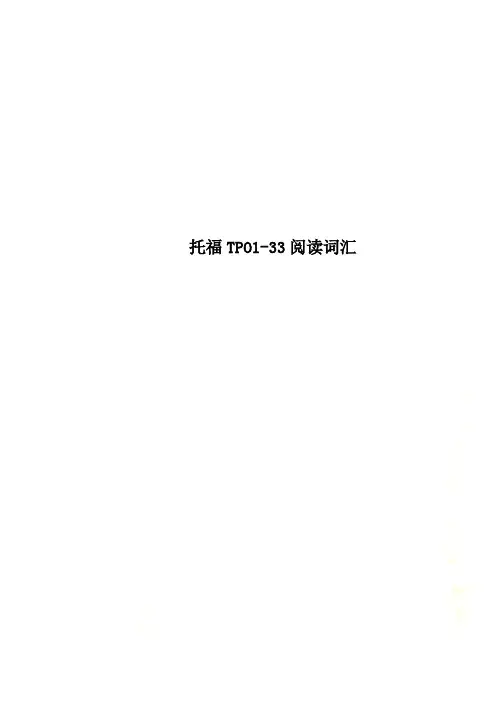
托福TPO1-33阅读词汇GROUNDWATERmeteoric(大气的)soak(渗透)precipitation(降雨量)pebble(卵石)gravel(沙砾)coarse(粗的)outwash(冲刷)fanwise(成扇形地)overlie(躺在……上面)pore(毛孔)cement(粘结,巩固)percolate(渗透)porous(多孔的)crystalline(结晶的)permeability(渗透性)cavity(洞)crevice(裂缝)plug(用塞子塞满)THE ORIGINS OF THEATERrely(信任)envision(想象)perceive(察觉)ritual(仪式)modify(修改,更改)oral(口头的)thereafter (此后)aesthetic(美学的)propose(提议)elaborate(详细说明)narrator(叙述者)pantomime(哑剧)impersonation(扮演)antecedent(祖先)whereby(借以)penchant(爱好)inclination(倾向,爱好)comic(滑稽的)nevertheless(尽管如此)retain(保持)fulfill(履行,完成)confront(面对)ARCHITECTUREenclose(围住)symbolic(象征的)grow out of(源于)dimensional(空间的)feasible(可行的)mediocre(平庸的)in terms of(就……而言)ease(简单)plumbing(管道装置)arduous(艰难的)pile(堆积,装载)segment(部分)drain(下水道)divert(转移)Depletion of the Ogallala Aquiferdepletion(消耗,逐渐耗尽)rancher(大牧场主)aquifer(蓄水层)well(水井)ensuing(继而发生的)tap(从……放出液体)sorghum(高粱)unprecedented(空前的,史无前例的)finite(有限的)negligible(不可忽略的)replenish(补充)dug(挖)necessitate(迫使)withdrawal(撤退)conserve(保存)grandiose(壮观的)inject(注射)triple(三倍的)strain(紧张)subsequent(随后的)The Long-Term Stability of Ecosystemsassemble(集合,聚集)flexibly(如意地)term(术语)pond(池塘)property(道具)climax(顶点,极点)invasion(入侵)pest(害虫)resilience(还原能力)fragile(易碎的,脆的)temperate(温和的)tricycle(三轮车)pale(变得苍白,变得暗淡)likewise(同样地)Opportunists and Competitorsmetabolism(n.新陈代谢)expenditure(花费,使用)squander(浪费)ultimately(最终地)dandelion(蒲公英)hollow(空的)dispersal(散布,传播)prolifically(多产地)term(把……称为)compensate (补偿)soar(往上飞舞)plummet(垂直落下)foul(难闻的)render(使成为)blend(混合物)Lascaux Cave Paintingsprehistoric(史前的)beast(兽)solemn(庄严的,严肃的)parade(游行,列队行进)bison(野牛)outline(勾勒)charcoal(木炭)smear(涂,沫)spray(喷射)stain(沾染,着色)recess(幽深处)cramped(狭窄的)obliterate(清除,涂去)conceivable(可相信的)realm(领域,范围)tribal (部落的)substantiate(实体化,证实)indecipherable(难辨认的)prone(俯卧的,有……倾向的)trance(出神,恍惚)uniformly(一致地)credence(相信,信任)mystique(n.神秘性)Electricity from Windturbine(涡轮机)in principle(原则上,基本上)moderate(中等的)heat-trapping(致温室效应气体的)lease(出租)projected(预期的)cell(电池)hydropower(水力发出的电力)interfere(妨碍)pit(与……较量)dwarf(变小)in place(在工作,准备就绪)virtually(实际上)Deer Populations of the Puget Soundprairie(大草原)understory(林下叶层)meadow(草地,牧场)browse(吃青草,绿叶等)bemoan(惋惜,认为遗憾)succulent(多汁的)game(猎物)elk(麋鹿)botanical(植物学的)disturbing(令人不安的)fort(城堡)plight (苦境)encroach(侵犯)yield(生产)rebound(反弹)substantially(本质上地)Cave Art in Europebead(小珠子)carving(雕刻)crude(天然的,未加工的)slab(平板)excavate(挖掘)gallery(走廊)bare(赤裸的)backdrop(背景)trapping(装饰)depict(描绘)chip(薄片,碎屑)herd(兽群)explicitly(明白地,明确地)portray(描绘,描写)hide(兽皮)tusk(牙)reindeer(驯鹿)confine(限制,局限于)engraving(版画,雕版印刷品)phase(阶段,时期)fertility(多产)Petroleum Resourcesdissolved(熔化的)deposit(沉淀物)droplet(小滴)squeeze(挤,榨)saturated(渗透的)valuable(宝贵的)underlie(存在于某物之下)derrick(起重机)portable(便携式的)dismantle(拆卸)spout(喷口)gusher(喷油井)refinery(精炼厂)hostile(有阻碍的)offshore(离岸的)spillage(溢出)foul(污染)subside(沉没,平息)Meteorites Impact and Dinosaur Extinctionmeteorite(陨星)catastrophe(灾难)dozen(十二个)intrigue(激起……的好奇心)paleontologist(古生物学家)diameter(直径)envelop(包围)crust(地壳)dilute(稀释)terrestrial(地球的)excavate(挖掘)crater(火山口)block(阻碍)plunge(使……陷入)presumably(ad.据推测)tentatively(试验性的,暂时的)evolutionary(进化的)niche(壁龛,凹进的地方)mechanism(途径)fundamentally(根本地)criterion(准则)cosmic(宇宙的)pose(造成)MINERALS AND PLANTSsource(来源)nitrogen(氮)nitrate(硝酸盐)ion(离子)notoriously(臭名昭著地,声名狼藉地)serpentine(a.像蛇般蜷曲的,蜿蜒的)calcium(钙)depletion(n.消耗,用尽)detect(发现)symptom(症状)chlorosis(萎黄病,变色病)chlorophyll(叶绿素)anthocyanin(花青素)stem(茎)stunt(阻碍成长)tissue(组织)herbaceou(草本)phosphorus(鳞)slender(a.苗条的,细长的)anthocyanin(花青素)discoloration(变色,污点)petiole(叶柄)omit(省略)facilitate(使容易)overabundance(n.过多)toxic(a.有毒的)saline(a.含盐的)sodium(钠)chloride(氯化物)lead(铅)mercury(水银)aluminum(铝)copper (铜)zinc(锌)amass(积累)shrub(灌木)tropical(热带的)pathogen(病菌)scenario(剧情说明,脚本)relocate(迁移)compound(n.复合物,化合物)excavation(挖掘)reburial(填埋)T HE ORIGIN OF THE PACIFIC ISLAND PEOPLEgreater(广义的)primarily(主要地)scattered(分散的)triangle(三角形)speculation(思考)solid(可靠的)fanciful(奇异的)deprecate(反对)navigational(航行的,航海的)anthropologist(人类学家)colonize(开拓殖民地)civilization(文明)drift(vi.漂,漂流)prevailing(一般的,普通的)domesticated(驯养的)marginal(贫瘠的)prerequisite(先决条件,前提)cultivated(耕种的)taro(芋头)yarn(纱)sugarcane(甘蔗)sago(西米)outrigger(支架)canoe(独木舟)voyage(航行)maroon(使(人)处于孤独无助之境)adrift(a.漂泊的,漂流的)deliberate(故意的,蓄意的)expedition(远征,探险,冒险)simulation(模仿,模拟)dynamic(动力)undisputed(无可置疑的)sweet potato(红薯)THE CAMBRIAN EXPLOSIONCambrian(寒武纪的)geologic(地质学的)eukaryotic(真核状态的)last(最近的)geologically(从地质上来说)evolved(进化)diversification(多样化)multicellular(多细胞的)paleontologists(古生物学家)interpretation(解释)fossilize(使成化石)exclusively(专门地)site(位置)descendant(后代)slide(滑落)favor(促成)predator(食肉动物)detritus(岩屑)algae(海藻)arthropod(节肢动物)mite(螨虫)crab(螃蟹)zoologist(动物学家)niche(生态位,一个生物所占据的生境的最小单位)pose(提出)discourage(阻碍)Powering the Industrial Revolution dramatic (巨大的)harness(利用)windmill(风车)textile(纺织品)steam(蒸汽)piston(活塞)cylinder(圆柱体,汽缸)atmospheric pressure(大气压)condense(使浓缩)vacuum(真空)reciprocating(a.往复的,来回的)rotary(旋转的,循环的)illumination(照明)millennium(一千年)charcoal(木炭)ore(矿石)retained(保持)multiply(使增加)canal(运河)turnpike(公路)hilly terrain(多山的地带)ingredient(成分,因素)laden(a.负重的,载满的)wagon(四轮的运货马车)flanged(带凸缘的)haul(拖,拉)stationary(不动的,静止的)William Smithroam(漫游,闲逛)apprentice(当学徒)parish(教区)proceed(继续)excavate(挖掘)canal(运河)outcrop(露出地面的岩层)revealed(露出的)strata(地层)coach(长途客运汽车)meticulously (异常细致地)catalog(编目录)calculate(估计)quartz(石英)ion(离子)Pleistocene(更新世的)shale(页岩)sandstone(砂岩)endure(长时间忍受)temporal(时间的)limestone(石灰岩)Jurassic(侏罗纪的)trilobite(三叶虫)ubiquitous(普遍存在的)arthropod(截肢动物)Infantile Amnesiainfantile(a.婴儿期的)amnesia(记忆缺失)scanty(a.缺乏的)distinctive(有特色的,与众不同的)sibling(n.兄弟,姐妹)enduring(a.持久的)repression(n.压抑)episode(情节,片段)toddler(初学走路的孩子)physiological(生理学的)psychological(心理学的)retrieve(回忆)explicit(明确的)verbal(言语的)extract(提取)gist(要点)verbalizable(可用言辞表达的)incompatibility(n.不两立,不相容)encode(把……编码)mismatch(n.不匹配)verbally(ad.言语上的)exclusive(排斥的)substantiate(证明)thoroughly(彻底地)reject(拒绝)The Geologic History of the MediterraneanMediterranean(地中海)vessel(船,舰)cruise(乘船游览)invertebrate(无脊柱的)domelike(穹顶状的)crystalline(结晶的)pebble(小圆石)gypsum(石膏)fragment(碎片)peculiarity(特性)strait(海峡)crustal(地壳的)evaporate(蒸发)calcium sulfate(硫酸钙)precipitate(沉淀)soluble(可溶的)sodium chloride (salt)(硫化钠)deluge(洪水)adjustment(调整)faulting(断层作用)cascade(倾泻)spectacularly(令人吃惊地)Ancient Rome and Greececohesiveness(粘合性)peculiarly(ad.特有地)cement(水泥)realm(王国,范围)monolithic(整体的)garrison(守备部队)utterly(ad.完全地)obsession(困扰)cohesion(凝聚力)scattered(a.分散的)territorial(领土的)stark(a.完全的)undeniable(无可否认的)legion(古罗马军团;众多,大量)rural(a.乡村的)engender(造成)virtue(美德)gravitas(n.庄严的举止)infinitely(无限地)worshipper(礼拜者)predisposed(a.倾向于……的)subtlety(狡猾)novelty(新奇的事物)disdain(轻视)debt(债务)moral(道德的)consciously(有意识地)tension(压力)Agriculture, Iron, and the Bantu Peoplesmillet(小米)sorghum(高粱)domestic(本国的,家庭的)chariot(马车)savannah(大草原)cavalry(骑兵)empire(帝国)innovation(改革)harsh(严厉的,严酷的)barrier(栅栏)intermediate(中间的)copper(铜)bronze(青铜)metallurgy(冶金学)penetrate(穿过)Nigeria(尼日利亚)Ghana(加纳)Mali(马里)shift(改变,改革)profound(a.深远的)complexity(复杂性)blacksmith(铁匠)hoe(锄)warrior(武士)ritual(宗教的,仪式性的)ingenious(设计独特的)furnace(熔炉)ore(矿物)migration(迁移)archaeologist(考古学家)demographic(a.人口统计学的)THE RISE OF TEOTIHUACANedifice(宏伟的建筑物)grid(n.网络)metropolis(n.首都,大城市)valley(峡谷)pinpoint(v.确定,精确地定位)shrine(宗教圣地)millennium(n.千年)ingenuity(独创性)foresightedness(先见之明)elite(n.精英)circumstantially(ad.偶然地)coexisted(同时存在)lava(熔岩)rival(竞争对手)modest(中等的)predominant(a.占主导地位的)along with(和……一起)commodity(n.商品)exotic(a.外来的)consciously(有意识地)inhabitant(居民)feedback(反馈)coerce(迫使)EXTINCTION OF THE DINOSAURS paleontologist(古生物学家)demise(死亡)alteration(改变)plate tectonics(板块构造学)shallow(浅的)geochemical(地球化学的)frigid(寒冷的)buffer(减轻)retreat(后退)crocodile(鳄鱼)torrid(酷热的)at the mercy of(任……摆布)crippled(跛的)conventional(传统的)clay(黏土,泥土)deposit(使沉淀,放置)iridium (lr) (铱)metallic(金属的)preferentially(优先地)meteorite(陨石)microscopic(微小的)bombard(撞击)calculation(计算)asteroid(小行星)fallout(灰尘)inhibit(抑制)photosynthesis(光合作用)disruption(扰乱)eradicate(灭绝)precede(v.在……之前发生)RUNNING WATER ON MARS channel(通道)interconnect(相互连接)merge(融合)resemblance(相似)thicker(较厚的)relic(遗产)relics(崩溃)catastrophic(灾难性的)onrushing(猛冲的,汹涌的)arise from(产生与,起因于)adorn(装饰)delta(三角洲)fan(扇形)crater(火山口)proponent(支持者)conceivably(令人信服地)detractor(诋毁者)Colonizing the Americas via the Northwest Coastcolonize(殖民)migration(迁移)corridor(走廊)crumble(崩溃)paleoecologist(古生态学家)radiocarbon(放射性碳)persuasively(口才好地)watercraft(水运船只)archaeologist(考古学家)continental shelf(大陆架)submerged(水下的)proponent(支持者)refuge(庇护所)deglaciation(冰消作用)sizable(相当大的)marine(海洋的)mammal(哺乳动物)REFLECTION IN TEACHINGscheme(计划,方案)paucity(缺乏)discipline(准则)void(空隙)abstraction(抽象)utilitarian(功利主义者)reveal(显示,透露)evaluate(评价)contributory(促成的)revise(修改)central(重要的)facilitate(使便利;促进)collaborative(合作的)inconsistency(矛盾)vaguely(含糊地)perceivable(可知觉的)vulnerability(易受伤)unexplored(未知的)externally(ad.在外部)THE ARRIV AL OF PLANT LIFE IN HAWAIIvolcano(火山)landmass(大陆)blazing(酷热的)drenching(湿透的)harsh(粗糙的)spore(孢子)breeze(微风)deposit(放置)toehold(不稳定的立足点)forbidding(冷峻的)lichen(地衣)flora(植物群)symbiotic(共生的)alga(水藻)fungus(真菌)molecule(分子)molten(熔化的)fern(蕨类植物)moss(苔藓)crevice(尤指岩石的裂缝)propagate(繁殖)afield(远离着家乡的)sheer(完全的)naked(裸露的)angiosperm(被子植物)wrap(包裹)tempting(诱人的)peach(桃)cherry(樱桃)dandelion(蒲公英)dormant(休眠的)buoyant(有浮力的)remarkably(引人注目地)prolonged(持续很久的)immersion(沉浸)archipelago(群岛)FEEDING HABITS OF EAST AFRICAN HERBIVORESbuffalo(水牛)herbivores(食草动物)illusory(貌似真实的)vegetation(植物)succulent(汁多味美的)sparsely(稀疏地)proportion(比例)extract (提取)gut(肠)derive(从……中获得)metabolic(新陈代谢的)provided that(需要进一步规定时常常使用)fastidious(过分挑剔的)LOIE FULLER devise(设计)shifting(转变)voluminous(大体积的)wand(棍,棒)costume(戏服)virtuosity(精湛技艺)prestigious(受尊敬的)stint(限制)accord(一致,符合)moral(道德上的)synthesize(综合)leaning(爱好)canvas(帆布)pane(窗玻璃)address(强调)invisibly(看不见地,无形地)agitate(摇动)simulate(模仿)stagecraft(编剧才能)Chinese Pottery pottery(陶器)porcelain(瓷器)ceramics(陶器)burial(埋葬)earthenware(土质瓷器)glazed(光滑的,像玻璃的)delineate(勾画,描述)ornament(装饰)tomb(墓穴)instigate(鼓动)cause (促使)ore(矿)muted(温和的)spout(喷口)precisely(精确地)adornment(装饰)obscured(不重要的)religious(宗教的)secular(世俗的)imperial(帝国的)assist(帮助)Seventeenth-Cen tury European Economic Growthreclamation(开垦)spectacular(壮观的)intrinsic(固有的,本身的)cottage(小屋,村舍)ravages(毁坏后的残迹)scant(不足的)remuneration(酬劳)meager(不足的)financiers(金融家)traders(商人)medieval(中世纪的)soap(肥皂)joint-stock(合资的,股份组织的)Variations in the Climateconstitute(构成)immensely(非常,极大地)complicate(使复杂化)interval(间隔时间)appreciably(略微,有一点地)ambient(周围的)annual(每年的)property(特性)nonetheless(虽然如此,但是)intriguing(非常有趣的)striking(显著的)chaotic(混乱的)erratic(不确定的)Orientation and Navigationperplex(使困惑)orient(使确定方向)restless(焦躁不安的)flutter(振翅)overcast(天阴的,多云的)surmise(推测)preposterous(荒谬的)planetarium(天文馆)domelike(穹顶状的)ceiling(天花板)rotate(旋转)magnetism(磁性)sonar(声纳系统)。
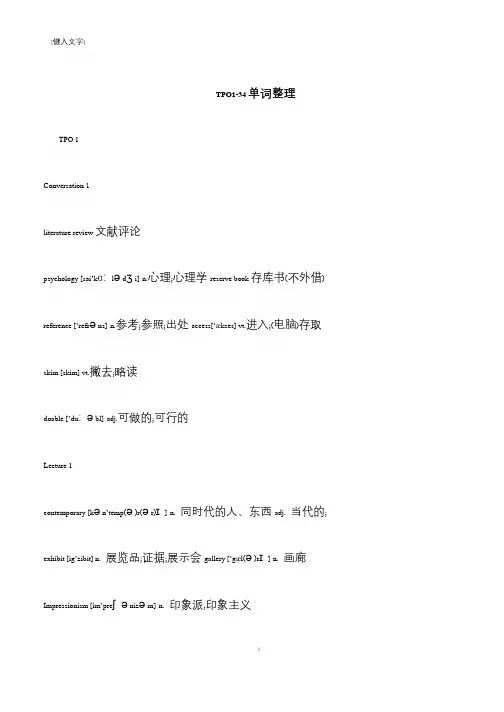
智课网TOEFL备考资料
托福TPO1-34阅读词汇题完整汇总(电子版)
摘要:托福TPO1-34阅读词汇题完整汇总(电子版)!新托福TPO阅读中,TPO阅读词汇题是重要托福阅读题型。
托福阅读词汇题做题需要考生掌握一定的词汇量和做题技巧,这样也可以帮助同学检验托福词汇的背诵效果,
同学们快来巩固一下吧!
托福 TPO1-34阅读词汇题完整汇总(电子版)! 新托福 TPO阅读中,TPO阅读词汇题是重要托福阅读题型。
托福
阅读词汇题做题需要考生掌握一定的词汇量和做题技巧,这样也可以帮助同学检验托福词汇的背诵效果,同学
们快来巩固一下吧!
Paragraph 1: In the fourteenth century, a number of political developments cut Europe's overland trade routes to southern and eastern Asia, with which Europe had had important and highly profitable commercial ties since the
twelfth century. This development, coming as it did when the bottom had fallen out of the European economy, provided an impetus to a long-held desire to secure direct relations with the East by establishing a sea trade. Widely reported, if somewhat distrusted, accounts by figures like the famous traveler from Venice, Marco Polo, of the willingness of people in China to trade with Europeans and of the immensity of the wealth to be gained by such contact made the idea irresistible. Possibilities for trade seemed promising, but no hope existed for maintaining the traditional routes over land A new way had to be found. 【TPO17- Europe's Early Sea Trade with Asia】
1. The word impetus in the passage is closest in meaning to
○Return
○Opportunity
○Stimulus
○Obstacle
Paragraph 3: At times, it is actually possible to watch the effects of natural selection in host-parasite relationships.
For example, Australia during the 1940 s was overrun by hundreds of millions of European rabbits. The rabbits destroyed huge expanses of Australia and threatened the sheep and cattle industries. In 1950, myxoma virus, a parasite that affects rabbits, was deliberately introduced into Australia to control the rabbit population. Spread rapidly by mosquitoes, the virus devastated the rabbit population. The virus was less deadly to the offspring of surviving rabbits, however, and it caused less and less harm over the years. Apparently, genotypes (the genetic make-up of an organism)
in the rabbit population were selected that were better able to resist the parasite. Meanwhile, the deadliest strains of the virus perished with their hosts as natural selection favored strains that could infect hosts but not kill them. Thus, natural selection stabilized this host-parasite relationship. 【TPO17- Symbiotic Relationships】
4. The word devastated in the passage is closest in meaning to
○ Influenced
○ Infected
○ strengthened
○ destroyed
Paragraph 4: In contrast to parasitism, in commensalism, one partner benefits without significantly affecting the other. Few cases of absolute commensalism probably exist, because it is unlikely that one of the partners will be completely unaffected. Commensal associations sometimes involve one species' obtaining food that is inadvertently exposed by another. For instance, several kinds of birds feed on insects flushed out of the grass by grazing cattle. It is difficult to imagine how this could affect the cattle, but the relationship may help or hinder them in some way not yet recognized. 【TPO17- Symbiotic Relationships】
7. The word inadvertently in the passage is closest in meaning to
○Indefensibly
○Substan tially
○Unintentionally
○Partially
相关推荐:
北美大学校园生活及学习常用词汇短语归纳
托福写作常用短语WORD版汇总
托福词汇常考词根大收录
相关字搜索:托福TPO1-34阅读词汇题汇总。